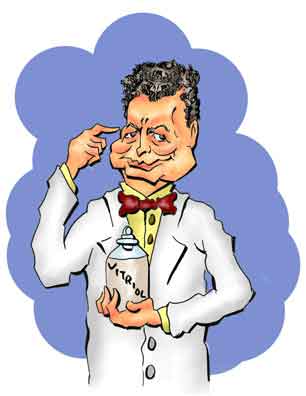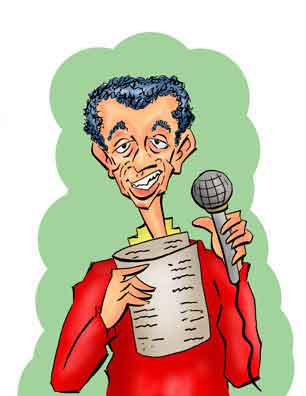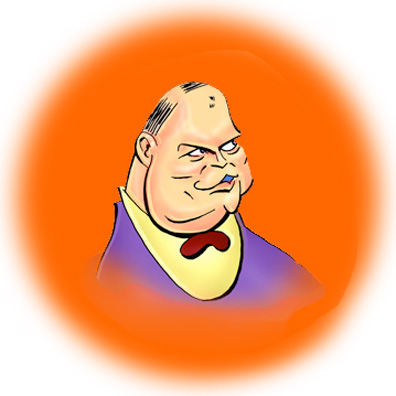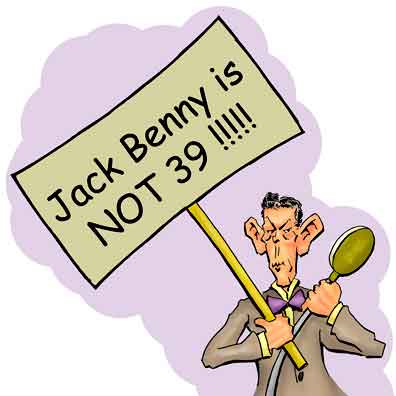Henry Morgan

Everyone knows that today's irreverent and vitriol filled comedians are nothing new. The legacy stretches back at least to the likes of 1950's and 60's Mort Sahl and Don Rickles.
But e'en before Don and Mort there was the comedian Henry Morgan whom today few comedy fans will know even if they do know about the early and curmudgeonly Fred Allen.
What made Henry's barbs unique was at whom they were tossed. It wasn't just at politicians (like Mort) nor at his audience (as did Don) and not even directed at Jack Benny (Fred). But instead and frequently, publicly, and openly, Henry hurled his slings and arrows at his sponsors1.
Footnote
Sponsors were companies that would fund an entire show, often for a whole season. In some cases, they paid the costs of a show over many years. So you could have the sponsor's name tackily in the title: Camel News Caravan, The Colgate Comedy Hour, Hallmark Hall of Fame, Kraft Television Theatre, Texaco Star Theater, and even - this is no joke - Schlitz Playhouse of Stars.
It's hard to believe that these were all real television shows. But it's even worse because the commercials might even be integrated into the program itself. There was a brand of cigarettes called Oasis which sponsored a variety show and where the guests entered through a door made like the Oasis trademark "O".
One advantage of the sponsored business model is that commercials were surprisingly limited. In a half hour segment, you'd have a one-minute commercial at the beginning, maybe two halfway through, and another at the end. So in a thirty minute program you would have about 25 minutes of actual show time.
The days of sponsors and alternate sponsors are long gone and a thirty minute show may have only 15 - 20 minutes of actual program. The time between commercials on one favorite program is about seven minutes which makes any kind of real continuity impossible. It's amazing how many people have no problem paying as much as $1000 a year to watch shows that are 50% commercials.

Establishing the legacy for Mort ...
Henry was born on March 31, 1915, in New York City as Henry Lerner von Ost, Jr. When he was 16, he landed a job as a page at a local radio station, WMCA. By the time he was 18 he was an announcer on another station, WCAU.
At both WMCA and WCAU, Henry's tenure was brief, either because of his sardonic humor - like including the radio station owner on a list of missing persons - or his stretching the rules such as when he assigned other announcers to do his night program so he could attend evening college classes. Fortunately at that time radio was a growing industry, and skilled radio announcers were in demand. So Henry continued with his career.

... Don ...
Also not all stations are in New York, and it was in Boston that Henry hit his stride. He also assumed the stage name Henry Morgan. He had two fifteen minute programs - yes, fifteen minute shows were common - and his oddball humor became popular, largely because no one knew what was going to come next.
It was also in Boston that Henry began twitting his sponsors. He once accused Life Savers of hoodwinking their customers by putting a hole in the center of the candy. Once he said he wouldn't wear a sponsor's shoes to a dog fight, and after a commercial for a new razor, Henry commented, "We'll continue as soon as we mop up the blood."
You'd suspect that Henry's unpredictable behavior pretty much guaranteed his programs wouldn't last long. And indeed their duration was typically from one to four years. His radio shows were Meet Mr. Morgan (1940), Here's Morgan (1940-1943 and 1945-1946), and The Henry Morgan Show (1946-1950). True, such durations weren't unusual for the time and four years was actually a good run. But you do wonder if more of his shows would have gone on longer if Henry hadn't had such an irreverent attitude toward his notoriously humorless sponsors.

... and keeping with that of Fred.
It was natural that Henry would become a pioneer of television. His first program on this new media was in 1948 with On the Corner and this was followed by Henry Morgan's Great Talent Hunt. Both shows lasted a year. Henry then hosted the television version of The Henry Morgan Show (1951), and Draw to Win (1952).
Henry's career hit a major snag during the Red Scare2 when his name was listed on the infamous (and inaccurate) pamphlet Red Channels which supposedly listed American Communists and Communists sympathizers. For a brief time, the only job Henry could get was a radio show interviewing customers in one of New York's restaurants. But one night one of the diners was Mark Goodson - who was one-half of the television-program producing dynamic duo of Goodson and Todman. Mark knew who Henry was, of course, and asked him to be a panelist on the quiz program, I've Got a Secret.
Footnote
There were actually two "Red Scares", the first arising after the Russian Revolution and it lasted from 1917 to about 1920. But the Red Scare most people mean was after World War II when the Soviet Union occupied Eastern Europe. Although the Red Scare has never really ended (try advocating the virtues of Gus Hall), it was at its height from 1950 to 1954 with the efforts of Joe McCarthy and the House Committee on Un-American Activities (HUAC). Non-Tailgunner Joe's methods became so outrageous that he was later officially censured by his fellow senators.
Today you'll get people pointing out that recent history has shown that the Soviets did indeed have extensive espionage activities in the United States during the 1950's and that "victims" of the Communist hunt like Alger Hiss and Martin Sobell were in fact guilty. However, during the Red Scare accusations of Communistic tendencies and out and out party membership were leveled at perfectly patriotic citizens - Leonard Bernstein, Eddie Albert, Aaron Copeland, and as we said Henry Morgan.
It need not be pointed out that the more rabid Red Scarers were motivated completely by political ambitions and didn't even believe what they were saying. In fact, one rabidly anti-Communist US Senator later was revealed to have given information to the Russians.
I've Got a Secret was, along with To Tell the Truth and What's My Line, one of the early, long-running, and even iconic celebrity panel shows that started up in the 1950's3. I've Got a Secret lasted (for the time) an incredible fifteen years (an attempt at revival in 1976 where Henry was also a panelist was not successful). On I've Got a Secret Henry became well-known to a new generation but less for his acerbic wit than merely being one of the celebrities who show up on television from time to time.
Footnote
Even today these shows sometimes find their way into everyday patois. For instance, someone referring to an inconsistent team by saying "Will the real Eagles (or Lions or Raiders) please stand up?" are borrowing the catch phrase from To Tell the Truth.
But it was on an episode of To Tell the Truth - with panelists Tom Poston, Kitty Carlisle, Art James, and Peggy Cass - that Henry really shone and in an unexpected manner. The contestant was a Polish diplomat who had also been a spy for the United States. Because he had to keep his identity secret he appeared in full head mask - essentially a bag with holes cut for the eyes and mouth. There were also the two usual - and in this case also masked - imposters who likewise spoke with an Eastern European accent. Keeping with the show's format, Tom, Kitty, Art, and Peggy each asked their questions and tried to guess who was the real spy.
After their allotted time, the panelists all cast their votes for Guest #3 - and when Contestant #1 stood up they realized that they had been completely fooled. Guest #2 brought considerable laughter since when unmasked he looked like the then-Soviet Premier Nikita Khrushchev.
But the BIG laugh came when Guest #3 - the unanimous choice of the panel - was unmasked to reveal - as you've probably guessed - Henry Morgan. Henry was, of course, well known and friends to all the panelist.
Henry ended his regular shows with the TV series My World and Welcome To It (1969-1970). For reasons on which we will not elaborate, his later years were beset with some difficulties which among other things led him to temporarily relocate to Canada. But he still did guest spots (including an appearance on Late Night with David Letterman), local radio programs, and voice-over work until he died in 1994, age 79.
References and Further Reading
"Henry Morgan", Biographical Dictionary of Radio, Christopher Sterling (Editor), Routeledge, 2011.
Try and Stop Me, Bennett Cerf, Simon and Schuster, 1944
"Henry Morgan", I've Got a Secret Online.
"Henry Morgan", WFMU's Beware of the Blog.
To Tell the Truth, Bud Collyer (Host), Kitty Carlisle (Panelist), Peggy Cass (Panelist), Art James (Panelist), Tom Poston (Panelist), Pawel Monat (Contestant), Henry Morgan (Contestant/Imposter), Johnny Olson (Announcer), Mark Goodson (Producer), Bill Todman (Producer), CBS, 1963, Internet Movie Data Base.